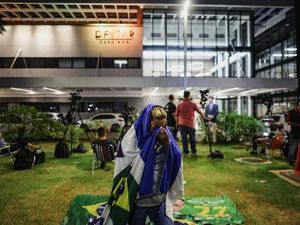American journalist Evan Gershkovich, working for the Wall Street Journal, faced the start of his espionage trial in Russia on Wednesday. The 32-year-old was seen with a shaved head, standing inside a glass defendants' cage.
The Russian government has accused Gershkovich of gathering secret information on behalf of the U.S. Central Intelligence Agency (CIA) concerning a company linked to tank manufacturing for Russia's invasion of Ukraine. If found guilty, he could face up to 20 years in prison.
Both Gershkovich and his employer have vehemently denied the accusations, insisting he was merely performing his duties as a journalist and was properly accredited by Russia's Foreign Ministry. The U.S. government has echoed these sentiments, advocating for his immediate release.
The proceedings of this high-profile trial are taking place behind closed doors, meaning no media personnel or even Gershkovich's family and U.S. embassy staff are allowed to attend. Such secretive arrangements are often standard procedure in trials involving espionage or treason charges within Russia.
This case emerges against the backdrop of heightened tensions between the U.S. and Russia, particularly since the outbreak of the war in Ukraine. Gershkovich’s detention has become emblematic of the deteriorated relations between the two nations, marking one of the most severe crises seen in over six decades.
Meanwhile, President Vladimir Putin has indicated the potential for discussions about a prisoner exchange involving Gershkovich, noting previous communication with the U.S. Although some diplomatic channels are rumored to be open, he emphasized these must remain secret.
The situation is precarious, with U.S. officials accusing Russia of using tactics resembling “hostage diplomacy” — detaining Americans to leverage political negotiations. The U.S. has officially designated Gershkovich and another detained American, Paul Whelan, as “wrongfully detained,” vowing to seek their safe return.
Now, the Washington Post's coverage of the Ukraine conflict has stirred additional controversy. Following reports on Ukrainian advances, Russia responded with threats against journalists, creating concerns about freedom of the press.
Three weeks after the release of Gershkovich was part of a high-stakes prisoner swap, Moscow warned Washington Post journalists who crossed the border alongside Ukrainian troops might face arrest. This incident underlines the volatile environment surrounding press freedoms, particularly for foreigners reporting on the war.
Ukrainian forces launched operations targeting strategic locations like Sudzha, underscoring their determination to reclaim territory. During such operations, journalists aim to reveal the realities on the ground, though these efforts often provoke hostile reactions from Moscow.
One Washington Post team, consisting of Siobhan O’Grady and photographer Ed Ram, was escorted to Sudzha by Ukrainian troops. Their article highlighted how residents were allegedly living under Ukrainian control, contradicting the Kremlin’s narrative.
Reports revealed locals feeling relieved by the presence of Ukrainian troops, who provided them with food and assistance. Such sentiments are perhaps alarming to Russia, as they challenge the perception of control the Kremlin wishes to maintain.
Russian authorities didn't react lightly to the Washington Post report and stated they were taking action against the American journalists involved. The Russian Foreign Ministry’s Maria Zakharova mentioned police were investigating the situation, which brought back fears of retribution against journalists.
Similarly, Italian journalists faced backlash after entering Kursk, where they documented Russian territory recently overtaken by Ukrainian forces. These developments signal a troubling trend: as tensions escalate, so do threats against media personnel documenting these events.
Despite this environment, journalism continues to play an integral role, often at great personal risk. Media professionals endeavor to keep the public informed, highlighting the struggles and realities faced by ordinary people amid conflict.
Just as Evan Gershkovich's trial casts shadows over press freedom, so does the crackdown against journalists covering the Ukraine war reflect broader issues concerning the safety of reporters. Their pursuit of truth often means working under the specter of threats, detention, or worse.
Press freedom advocates call for global attention on cases like Gershkovich's, emphasizing the fundamental importance of journalists’ rights. These rights matter now more than ever as conflicts rage and states tighten control over information.
The international community watches closely, hoping diplomatic efforts might secure the release of Gershkovich and show support for journalists everywhere. The stakes remain perilously high, as both sides navigate the intricacies of war, politics, and freedom of expression.



